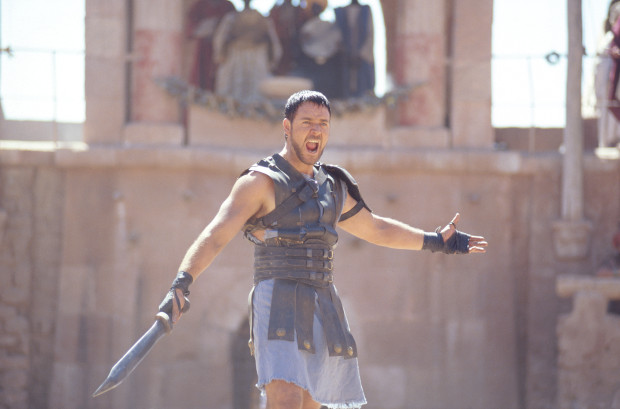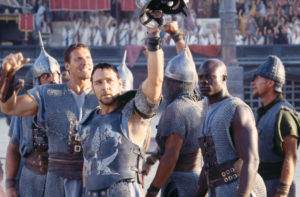
The emotional level of the spectacle just never goes out of style…
It’s hard to believe but it’s been 20 years since the spectacle of Gladiator; the tale of Maximus Decimus Meridius a brave general who was forced into slavery and emerged a gladiator and hero to Rome has graced the big screen. Now available in a brand new 4K SteelBook for all to enjoy, the movie is as timeless now as it ever was…
In advance of this release we got the unique pleasure to sit down and talk with producer Doug Wick about his experiences on the film.
Dave Voigt: This is always something that kind of fascinates me because there really (at least until recently) ever been a kind of ‘producer school’ where people could learn what’s involved in producing films. Can you sort of walk me through your origin of how you found yourself in this job?
Doug Wick: I made Super 8 movies in high school, and I was interested in movies in college but we didn’t exactly have internships that you could apply for in those days. So when I got out, I decided I wanted to be in the business and I went to work for Alan J Pakula who had just made All The President’s Men. Through him I started to learn about the movie business and it ultimately became clear that producing was what I ultimately wanted to do, which is find stories, generate them to the point that we can make them into movies. That’s what really spoke to me.
Now I look through your CV (i.e. IMDB page) and you’ve worked with some interesting people on interesting stuff and aside from Stuart Little which has all the challenges of CGI and animation to it but Gladiator feels like it was a big step up in scale. Can you tell me a little about how this story first came across your desk?
Basically David Franzoni, a writer on the film came into me about doing a movie in the Roman arena and pitched me on why that would be a great target and specifically had the historical research that showed me how a wrestler had actually killed the emperor Commodus. Out of that we started to craft a pitch on a film set in the Roman gladiatorial arena which was the pitch that we took to DreamWorks at the time. Also in the research we found many examples of people doing well in their society but if they pissed off the emperor they could easily become cannon fodder in the games of the arena and that really clicked for us. I knew enough about movies that if we take a protagonist and start him off at the top of society; pull away all the privilege and context so that we could see who he really is when he is laid bare is the stuff of a great story.
It was really that beginning and in the research for it all we could see that there were so many attended technologies involved in the Roman arena, things like animal husbandry and drainage. So many of the best minds of that society were focused on that as well, we knew all of these elements could make for a really cool movie and that’s really where the journey on something like this begins.
I love how you’re bringing up research because there are so many unique and interesting details in this film and I’m curious; from your role as a producer do films like this typically get born out of the research or is it about managing creative or even just the pedantic yet necessary take of finding the money to do it all?
To be honest it’s a combination of everything because the biggest challenge on this film is that we were essentially making a fight film, and those tend to be episodic. To get each fight to move the narrative forward was challenging in and of itself. Plus in the research which Ridley was so key in because let’s face it, his first film was The Duelists and the man knows how to do fight scenes. When we were struggling with Maximus’ progression and trying to make sure that the audience won’t hate him for killing all these people, we ended up dissecting what the most spectacular kind of spectacle was and we had this scene written into the movie with a Rhino and we ended up talking to the animal wranglers who agreed it would look great on film but the problem is that once you get a Rhino revved up and going, you can’t really stop them. So we decided to get an estimate on creating a CG Rhino which just ended up being far too expensive at that stage we just couldn’t afford to do it. It always ends up being a weird combination of forces when making a film but it’s always fundamental that creative stays in the forefront.
How do you balance ‘spectacle’ vs. ‘story’ on a film like Gladiator?
Well firstly, you have to get a great director. Ridley has always been such a full service storyteller that it was never in doubt what the priority of any given scene was for him. There are a lot of director’s who just don’t have that sense and they’ll focus on spectacle regardless of if it moves the story forward or not. You’ll easily spend an extra $100 million dollars that you’ll eventually end up cutting away because the director may just not have seen it that way at the time.
With Ridley, once the story is all mapped out, he can literally say during a moment when we are filming in the Coliseum that “OK, we only need part of the stands to be filled part of the way because we’ll be doing this scene close up and we need another shot over there in the same vein. Very few directors can actually work like that and when you have a partner with those kinds of skills it makes your job as a producer a lot easier.
Are there lessons that you pull from a job like this going into other productions?
You know the real lesson that you learn when you are trying to make that magic happen and the lightening strike in just the right way is to make sure you are surrounded with as many uniquely talented people as humanly possible. People who know how to work in this constructive process where you are hoping that everything will add up to more than the sum of its parts and that’s incredibly difficult to recreate. I had it on Working Girl with Mike Nichols and partly that happens because with people who can really work like this and something isn’t working, it brings out the worst in them, even if they don’t know it and then you can look back on it later and understand that’s why everyone was acting like an asshole because they knew that it just wasn’t working and they were being unconstructive, but Ridley really set the tone. From the beginning of production he really had a clear sense of what the film could really be and he was very collaborative, especially when we all knew we had to tweak the third act but it really comes down to surrounding yourself with the kind of team that is more than the sum of its parts and trying to make that magic happen as best you can.
We live in such a world right now where we are simply inundated with content and so many ways to consume and I’m curious how this modern age of content has changed your job at all?
Over the years, what’s really been the fun challenge of the job is asking simply “Why should the audience give a shit?” There are certain movies that you just couldn’t get made now, at the big studios something like Working Girl would never get off the ground but if you find the financing someone like a Netflix would certainly take it. What you are trying to do is just to get a great movie made and as the marketplace changes, what are the opportunities? The studios want the spectacle but all the streamers have opened all these new opportunities to make a lot crap, but if you’re aspiring to make the next Breaking Bad it will find a giant audience but once the streamers max out everything it will come back to finding a reason to get people to watch your product, to make great work happen and at the end of the day that’s the best part of the job.

